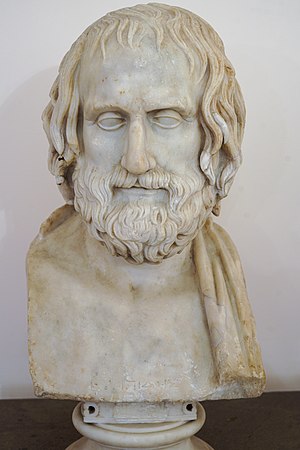“But learn that to die is a debt we must all pay.”
What dost thou? dost thou leave us?
ALC. Farewell!
ADM. I am an undone wretch!
CHOR. She is gone, Admetus' wife is no more.
EUM. Alas me, for my state! my mother is gone indeed below; she is no
longer, my father, under the sun; but unhappy leaving me has made my life
an orphan's. For look, look at her eyelid, and her nerveless arms. Hear,
hear, O mother. I beseech thee; I, I now call thee, mother, thy young one
falling on thy mouth--
ADM. Who hears not, neither sees: so that I and you are struck with a heavy
calamity.
EUM. Young and deserted, my father, am I left by my dear mother: O! I that
have suffered indeed dreadful deeds!--and thou hast suffered with me, my
sister. O father, in vain, in vain didst thou marry, nor with her didst
thou arrive at the end of old age, for she perished before, but thou being
gone, mother, the house is undone.
CHOR. Admetus, you must bear this calamity; for in no wise the first, nor
the last of mortals hast thou lost thy dear wife: but learn, that to die is
a debt we must all of us discharge.
ADM. I know it, and this evil hath not come suddenly on me; but knowing it
long ago I was afflicted. But be present, for I will have the corse borne
forth, and while ye stay, chant a hymn to the God below that accepteth not
libations. And all the Thessalians, over whom I reign, I enjoin to share in
the grief for this lady, by shearing _their locks_ with steel, and by
arraying themselves in sable garb. And harness[24] your teams of horses to
your chariots, and cut from your single steeds the manes that fall upon
their necks. And let there be no noise of pipes, nor of the lyre throughout
the city for twelve completed moons. For none other corse more dear shall I
inter, nor one more kind toward me. But she deserves to receive honor from
me, seeing that she alone hath died for me.
CHORUS.
O daughter of Pelias, farewell where thou dwellest in sunless dwelling
within the mansions of Pluto. And let Pluto know, the God with ebon locks,
and the old man, the ferryman of the dead, who sits intent upon his oar and
his rudder, that he is conducting by far the most excellent of women in his
two-oared boat over the lake of Acheron.
“Danger gleams like sunshine to a brave mans eyes.”
Ho, Pylades,
Sole sharer of my quest: hast seen it all?
What can we next? Thou seest this circuit wall
Enormous? Must we climb the public stair,
With all men watching? Shall we seek somewhere
Some lock to pick, some secret bolt or bar--
Of all which we know nothing? Where we are,
If one man mark us, if they see us prize
The gate, or think of entrance anywise,
'Tis death.--We still have time to fly for home:
Back to the galley quick, ere worse things come!
PYLADES.
To fly we dare not, brother. 'Twere a thing
Not of our custom; and ill work, to bring
God's word to such reviling.--Let us leave
The temple now, and gather in some cave
Where glooms the cool sea ripple. But not where
The ship lies; men might chance to see her there
And tell some chief; then certain were our doom.
But when the fringed eye of Night be come
Then we must dare, by all ways foul or fine,
To thieve that wondrous Image from its shrine.
Ah, see; far up, between each pair of beams
A hollow one might creep through! Danger gleams
Like sunshine to a brave man's eyes, and fear
Of what may be is no help anywhere.
ORESTES.
Aye; we have never braved these leagues of way
To falter at the end. See, I obey
Thy words. They are ever wise. Let us go mark
Some cavern, to lie hid till fall of dark.
God will not suffer that bad things be stirred
To mar us now, and bring to naught the word
Himself hath spoke. Aye, and no peril brings
Pardon for turning back to sons of kings.
[They go out towards the shore. After they
are gone, enter gradually the WOMEN]
OF THE CHORUS.
CHORUS.
Peace! Peace upon all who dwell
By the Sister Rocks that clash in the swell
Of the Friendless Seas.
O Child of Leto, thou,
Dictynna mountain-born,
To the cornice gold-inlaid
To the pillared sanctities,
We come in the cold of morn,
We come with virgin brow,
Pure as our oath was sworn,
Handmaids of thine handmaid
Who holdeth the stainless keys,
From Hellas, that once was ours,
We come before thy gate,
From the land of the western seas,
The horses and the towers,
The wells and the garden trees,
And the seats where our fathers sate.
